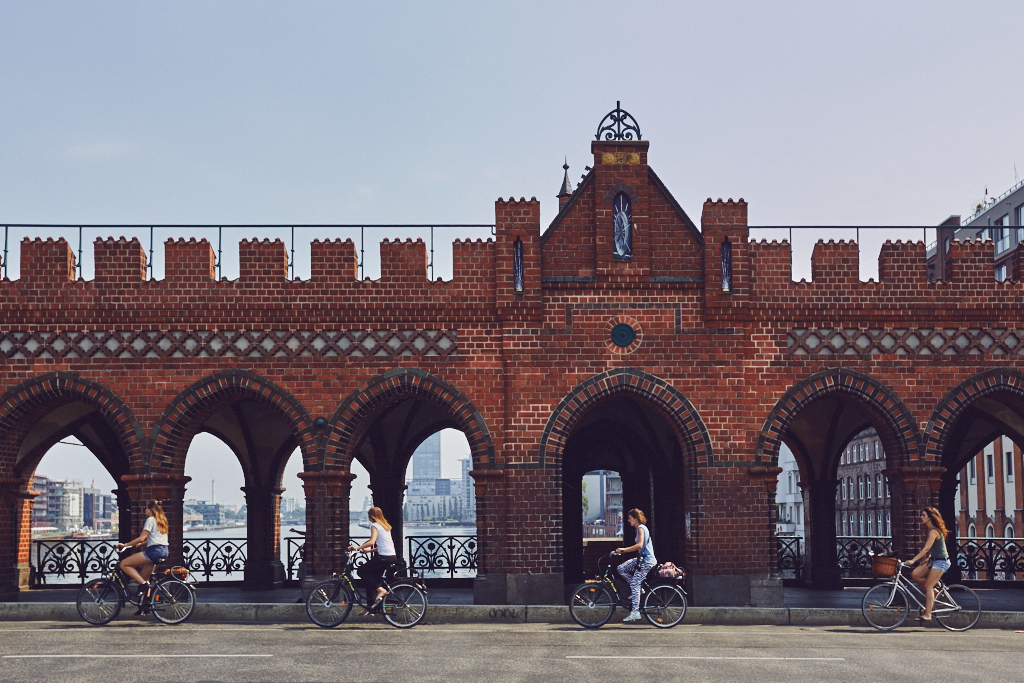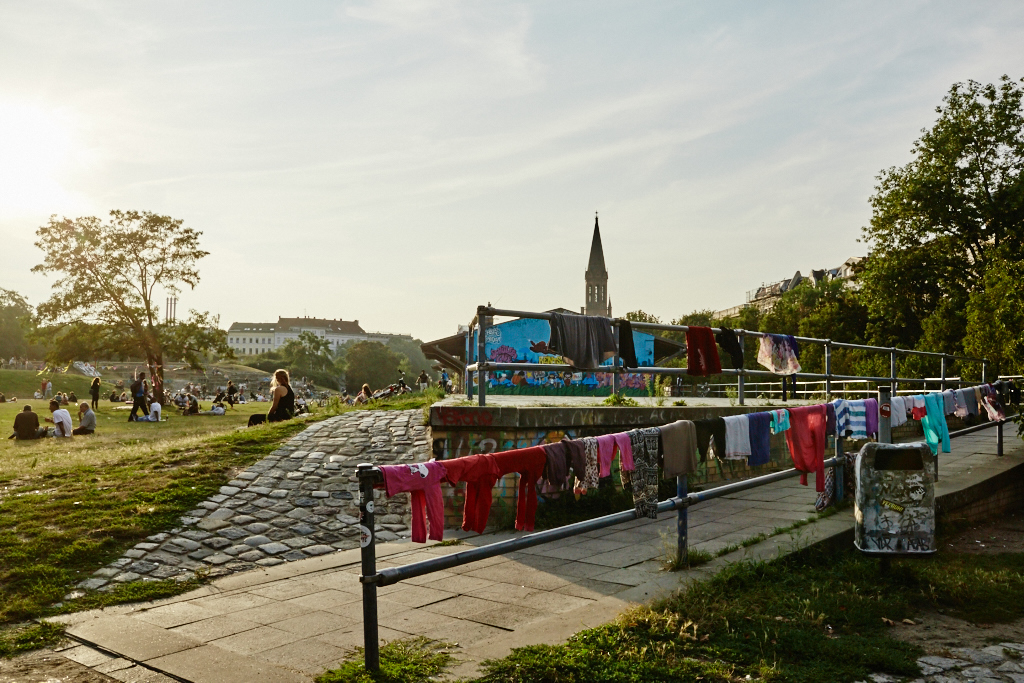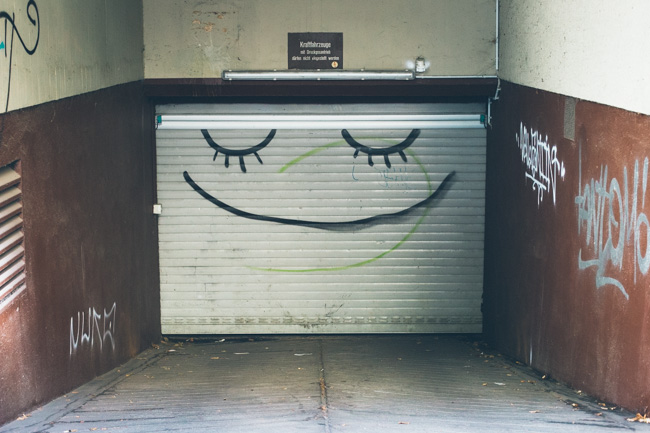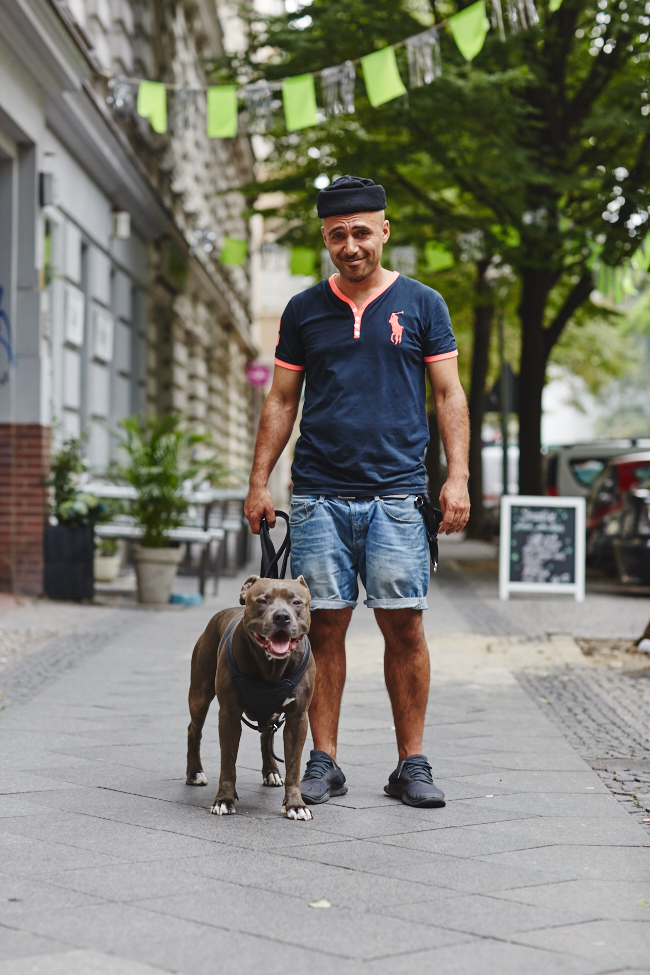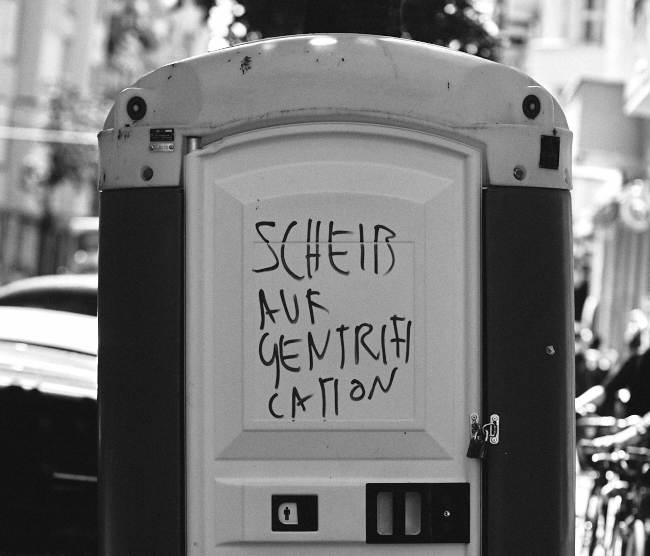On blogging: The great “viral content” swindle
by James Glazebrook
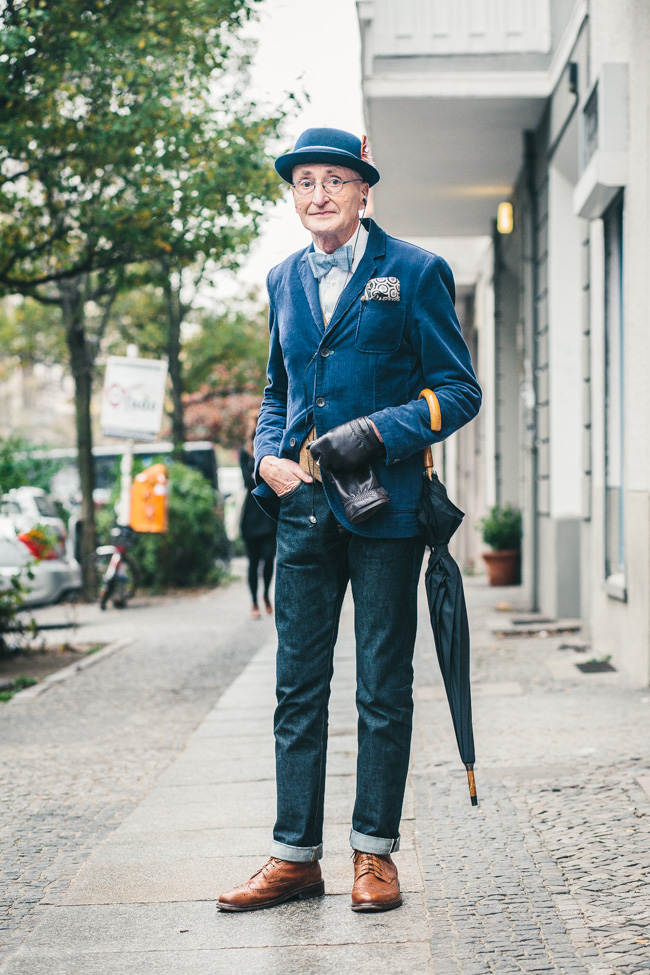
You may have seen this dashing fellow on the Internet recently. You might have even seen these photos. If you did, the site you were looking at stole Zoë’s photos, published them without her consent, and used them to generate traffic and, most likely, revenue.
It all started when So Bad So Good shared some photos to their Facebook page, of the alleged 104-year-old, posing on the platform for the U1 at Kotti. It isn’t clear where they got those images from, as they didn’t include any kind of credit. But we do know that the man pictured, Günther Krabbenhöft – represented by “agents for unique characters”, We Are Unlike You – isn’t 104. More realistic estimates put him at around 70.
Spotting an opportunity, I commented on the post with a link to our own blog post, a streetstyle shot of Günther walking through Graefekiez. Sure enough, that brought us a lot of clicks – about 40% more traffic than in the previous month – but it also brought the attention of websites that pride themselves on finding and sharing viral content. They refer to it as “sharing”, but we call it what it is: stealing.
The biggest, and probably the first, of those was Bored Panda (no, we aren’t going to link to them!). We found them via a trackback, a notification that WordPress sends us whenever someone links to one of our posts. Clicking through, we were shocked to see Zoë’s photos being used in a post that (apparently) now has over 180,000 views, 50,000 Facebook Likes, and is surrounded by ads that make money for the site’s owners. Alarmingly, there’s an “Add post” button that allows anyone to create their own article, with terms of use that place the responsibility for copyright compliance on the “author”.

Bored Panda set the tone for all the other articles we were able to find through trackbacks and Google reverse image search (which we learned about from @eljojo – thanks!) Have a look here – each of those thumbnails leads to at least one article that has used that image in those dimensions. That’s just one of our three images of Günther, and it doesn’t included photos edited beyond recognition by Google’s bots.
Most of the articles we found included the 104, many with that weird get-out that “the Internet” is getting its facts wrong, and all featured images alongside ours from sources who presumably weren’t contacted for permission either. A lot of them completely ripped off the “original” Bored Panda article. But, as it’s not their content anyway, why should they care?
When we contacted Bored Panda, we received an email from the article’s author saying that they’d decided to remove the images. The fact that they responded so quickly, to an email sent via a form that actually has a field for “removal request”, leads us to believe that they subscribe to the school of thought that one should “ask for forgiveness, not permission”.

Bored Panda were only closing the barn door after the horse had bolted. By the time our images were taken down from that site, they were all over the “viral” Internet. It takes just one website to turn stolen content into fair game, and other sites are happy to rip off photos, as long as they include the name of the source, and a link to it. Those second-tier sites are legion, and rarely have contact details through which to demand a removal.
A couple of bigger websites approached us for our permission (denied), and, when pushed, a national British newspaper offered an insubstantial amount of money. Given the circumstances, we were almost flattered that people had thought to ask us, but Zoë can’t pay her rent with “credits”, and we can’t build an audience on the clicks of curious people wanting to ogle an apparently ancient “hipster”. Our uptick in traffic came primarily from my comment on So Bad So Good’s Facebook post, and those people won’t be back. If we were playing the same “viral” game as these websites, those clicks would translate into money. But we aren’t – we’re focussed on creating original content.
And that’s the most depressing part of all of this: watching the Internet cannibalise itself. As soon as one online entity had a “hit” with the Günther photos, everyone else had to have them. Major newspapers and best-selling magazines aren’t above this – everyone wants the hot new thing to post, in the hopes that their improved Google rank will inch their audience, and profits, up ever so slightly. This “viral” layer of the web relies on content creators like us to thrive, but we won’t be able to create the content it needs if we can’t make a living. It’s pretty disgusting to see this up close.
So where does that put us? We’ve been advised that we are in a position to demand our content’s removal from all these websites, and to even invoice them for the revenue they likely generated from it. But how do you contact a site that doesn’t feature so much as an email address, and what are your chances of getting a response, let alone compensation? Right now, we’re focused on INTERVIEW.de, who aren’t responsive despite me taking to Twitter and Facebook to complain (sound familiar?) We think they’re taking Andy Warhol’s art of appropriation a little too far…
Let’s be clear: we love it when you share our content. When you tweet one of our photos and @-mention us, you could bring us followers; when you link to our website, we may gain readers. Sharing the photo without a credit isn’t exactly in the spirit of Twitter, but at least you wouldn’t be making money from our creative work. To all our genuine fans, thank you for sharing!
And to all the people out there creating unique content, keep up the good work. Take solace in the fact that this is one of the few cases of plagiarism we’ve (knowingly) experienced, and it can be traced back to us “putting ourselves out there”. Let us know if you ever encounter anything like this, and we’ll be happy to share our learnings and give you some support. Together, we’ll kick some web ass!

EDIT: INTERVIEW.de have since responded to my Facebook post and taken down the photos. However, I still take exception to them using the photos in the first place. Here’s how that conversation is developing…

 “Alles kann, nichts muss”, as the Germans say. What this means is that the fact you are attending a sex party does not necessarily mean that you’ll end up having wild group sex on the dancefloor. Only if you feel like it and only if the party allows it. While many people probably assume that sex clubs are places where everything is allowed, this couldn’t be further from the truth.
“Alles kann, nichts muss”, as the Germans say. What this means is that the fact you are attending a sex party does not necessarily mean that you’ll end up having wild group sex on the dancefloor. Only if you feel like it and only if the party allows it. While many people probably assume that sex clubs are places where everything is allowed, this couldn’t be further from the truth. If you are attending a sex event, know that there is no place for politeness. What I mean is that if a situation is bothering you, you should not say so. I have been hesitant myself, but being straightforward is a must, so if you are afraid of making your move, ask someone to do the dirty work for you.
If you are attending a sex event, know that there is no place for politeness. What I mean is that if a situation is bothering you, you should not say so. I have been hesitant myself, but being straightforward is a must, so if you are afraid of making your move, ask someone to do the dirty work for you. Every time I engaged in or witnessed threesomes or group sex, I remember being amazed at the level of consideration couples gave to each other. Much to my surprise, I found that couples that engage in this kind of activity seem to have more balanced and healthier relationships, at least from the outside. They’re the kind of people who will outright say when they are not comfortable with a situation instead of sulking or making a scene. And the other person will take the criticism just fine.
Every time I engaged in or witnessed threesomes or group sex, I remember being amazed at the level of consideration couples gave to each other. Much to my surprise, I found that couples that engage in this kind of activity seem to have more balanced and healthier relationships, at least from the outside. They’re the kind of people who will outright say when they are not comfortable with a situation instead of sulking or making a scene. And the other person will take the criticism just fine. On a more shallow note, don’t forget that there is nothing worse than attending an event and feeling like your outfit isn’t quite right. In fact, dressing up is a great part of the fun.
On a more shallow note, don’t forget that there is nothing worse than attending an event and feeling like your outfit isn’t quite right. In fact, dressing up is a great part of the fun. Brace yourself for the fact that you will probably witness a few situations you never expected to. I have seen things that would normally qualify as crazy, such as grown men wearing diapers or a girl holding a knife ridiculously close to a guy’s penis and occasionally poking it.
Brace yourself for the fact that you will probably witness a few situations you never expected to. I have seen things that would normally qualify as crazy, such as grown men wearing diapers or a girl holding a knife ridiculously close to a guy’s penis and occasionally poking it. Embrace the fact that this is your chance to try out new things. Most people who attend sex parties on the reg are ready to be your guide if you need them to.
Embrace the fact that this is your chance to try out new things. Most people who attend sex parties on the reg are ready to be your guide if you need them to. While it’s totally fine to be buzzed at “entry level” parties where most sexual acts happen in dark rooms or other dedicated areas, you don’t want to make a fool of yourself while other people are trying to get busy.
While it’s totally fine to be buzzed at “entry level” parties where most sexual acts happen in dark rooms or other dedicated areas, you don’t want to make a fool of yourself while other people are trying to get busy. Bring condoms with you (even if you are a girl), but also know that you will always be able to get some for free at the bar – this also applies to
Bring condoms with you (even if you are a girl), but also know that you will always be able to get some for free at the bar – this also applies to 


